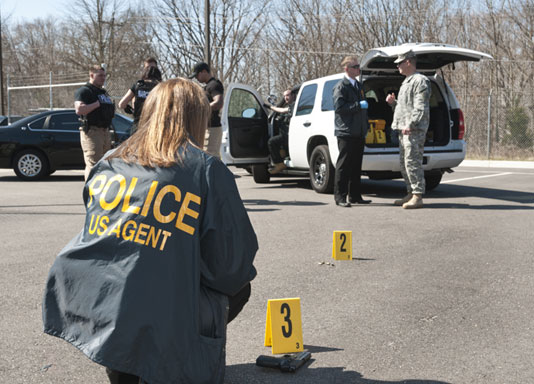Investigations
 CID/MPI Investigations
CID/MPI Investigations
If you are being investigated by CID, MPI, or the MP's, it is important you have an attorney preserve your rights and guide you through the investigative process before making any statement or giving consent for a search!
The Military Police Corps is the uniformed law enforcement branch of the United States Army. Investigations are conducted by Military Police Investigators or the United States Army Criminal Investigation Command (USACIDC), both of which report to the Provost Marshal General. CID does not charge subjects of investigations with crimes. CID investigates allegations of wrongdoing and once an investigation is completed, turns the findings over to the appropriate command and legal authority for disposition and adjudication. Once a person is charged with a crime, that information may become public record through an Article 32 Hearing, Courts Martial etc.
CID Special Agents primarily investigate felony-level crime across the Army and provide investigative support to field commanders. They conduct a wide variety of investigations to include deaths, sexual assault, armed robbery, procurement fraud, computer crimes, counter-drug operations and war crimes. CID agents also provide counter-terrorism support, criminal intelligence support, force protection, forensic laboratory investigative support, and protective services for key Department of Defense and senior Army leadership.
AR 15-6 Investigations
If you are being investigated by a AR 15-6 Investigating Officer, it is important you have an attorney preserve your rights and guide you through the investigative process before making any statement or giving consent for a search!
AR 15-6 procedures generally govern investigations requiring detailed fact gathering and analysis and recommendations based on those facts. An "investigation" is simply the process of collecting information for the command, so that the command can make an informed decision. AR 15-6 sets forth procedures for both informal and formal investigations.
Informal investigations usually have a single investigating officer who conducts interviews and collects evidence. In contrast, formal investigations normally involve due process hearings for a designated respondent before a board of several officers. Formal procedures are required whenever a respondent is designated.
Commander’s Inquiries
If you are being investigated by an Investigating Officer conducting a Commander's Inquiry, it is important you have an attorney preserve your rights and guide you through the investigative process before making any statement or giving consent for a search!
If a commander receives information that a member of his or her command is accused or suspected of committing an offense or offenses triable by court-martial, the immediate commander is required to make or cause to be made a preliminary inquiry into the charges or suspected offenses. This preliminary inquiry is usually informal.
In the case of simple, minor offenses the inquiry may simply be a matter of the commander obtaining information from the suspected offender’s chain of command. In complex or serious cases the commander should seek the assistance of law enforcement investigators when conducting the preliminary inquiry.
The CFML is fully versed with all types of Military Law and can help you with your defense. Contact us today.
